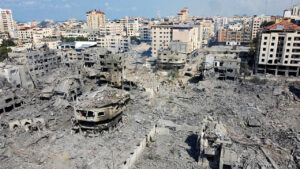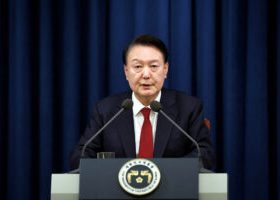UNITED NATIONS (UN) — The United States has proposed a rival draft United Nations Security Council resolution calling for a temporary ceasefire in the Israel-Hamas war and opposing a major ground offensive by its ally Israel in Rafah, according to the text seen by Reuters.
The move comes after the US signaled it would veto on Tuesday an Algerian-drafted resolution — demanding an immediate humanitarian ceasefire — over concerns it could jeopardize talks between the US, Egypt, Israel and Qatar that seek to broker a pause in the war and the release of hostages held by Hamas.
Until now, Washington has been averse to the word cease-fire in any UN action on the Israel-Hamas war, but the US text echoes language that President Joseph R. Biden said he used last week in conversations with Israeli Prime Minister Benjamin Netanyahu. It would see the Security Council “underscore its support for a temporary ceasefire in Gaza as soon as practicable, based on the formula of all hostages being released, and calls for lifting all barriers to the provision of humanitarian assistance at scale.”
The United States does “not plan to rush” to a vote and intends to allow time for negotiations, a senior US administration official, speaking on condition of anonymity, said on Monday.
To pass, a resolution needs at least nine votes in favor and no vetoes by the US, France, Britain, Russia or China.
The US draft text “determines that under current circumstances a major ground offensive into Rafah would result in further harm to civilians and their further displacement including potentially into neighboring countries.”
Israel plans to storm Rafah, where more than 1 million of the 2.3 million Palestinians in Gaza have sought shelter, prompting international concern that an assault would sharply worsen the humanitarian crisis in Gaza. The UN has warned it “could lead to a slaughter.”
The draft US resolution says such a move “would have serious implications for regional peace and security, and therefore underscores that such a major ground offensive should not proceed under current circumstances.”
Washington traditionally shields Israel from UN action and has twice vetoed council resolutions since the Oct. 7 attack on Israel by Hamas militants. But it has also abstained twice, allowing the council to adopt resolutions that aimed to boost aid to Gaza and called for extended pauses in fighting.
‘WARNING SHOT’
This is the second time since Oct. 7 that Washington has proposed a Security Council resolution on Gaza. Russia and China vetoed its first attempt in late October.
While the US was ready to protect Israel by vetoing the Algerian draft resolution on Tuesday, International Crisis Group UN Director Richard Gowan said Israel would be more concerned by the text Washington drafted.
“The simple fact that the US is tabling this text at all is a warning shot for Netanyahu,” he said. “It is the strongest signal the US has sent at the UN so far that Israel cannot rely on American diplomatic protection indefinitely.”
Israel’s mission to the United Nations in New York did not immediately respond to a request for comment on the US draft.
A second senior US administration official, speaking on condition of anonymity, said the US draft does not suggest “anything about the dynamics of any particular relationship, whether that’s with the Israelis or any other partner we have.”
The draft US text would condemn calls by some Israeli government ministers for Jewish settlers to move to Gaza and would reject any attempt at demographic or territorial change in Gaza that would violate international law.
The resolution would also reject “any actions by any party that reduce the territory of Gaza, on a temporary or permanent basis, including through the establishment officially or unofficially of so-called buffer zones, as well as the widespread, systematic demolition of civilian infrastructure.”
Reuters reported in December that Israel told several Arab states that it wants to carve out a buffer zone inside Gaza’s borders to prevent attacks after the war ends.
The war began when fighters from the Hamas militant group that runs Gaza attacked Israel on Oct. 7, killing 1,200 people and capturing 253 hostages, according to Israeli tallies. In retaliation, Israel launched a military assault on Gaza that health authorities say has killed nearly 29,000 Palestinians with thousands more bodies feared lost amid the ruins.
In December, more than three-quarters of the 193-member UN General Assembly voted to demand an immediate humanitarian ceasefire. General Assembly resolutions are not binding but carry political weight, reflecting a global view on the war. — Reuters







